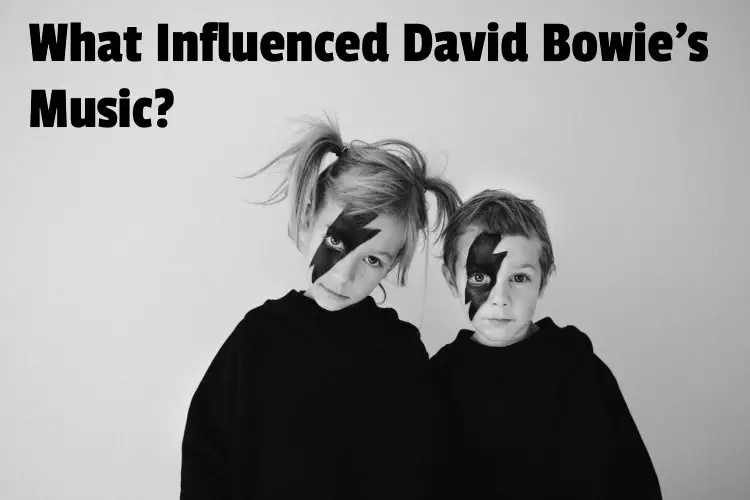
David Bowie was an iconic musician loved for decades. But, while many took inspiration from him, let’s find out what influenced David Bowie’s music.
Here is what I have learned:
David Bowie took inspiration from a variety of genres and artists, but The Velvet Underground is the most influential one. But Bowie also had a lifelong love for John Lennon whose work with The Beatles had a profound influence on Bowie’s creativity and willingness to experiment with sound.
But Bowie’s musical catalog is really broad and includes a wide variety of styles. He listened and took inspiration from several artists, including- Little Richard, Marc Bolan, Elvis Presley, Syd Barrett, Harry Partch, etc.
He sought new methods of soundscapes to explore new styles like rock, pop, electro-beats, Jazz, and drum-and-bass. All these clubbed together helped shape Bowie’s full spectrum in music.
Let’s find out some more details about the enigmatic icon.
David Bowie’s favourite Velvet Underground track #LouReed https://t.co/zvleFqUvou pic.twitter.com/63kfjHnzf9
— Brian Eno News (@dark_shark) February 21, 2022
What kind of music did David Bowie like?
Bowie was a devoted music lover with diverse tastes. He listened to everything from Scott Walker, Sonny Smith, the Legendary Stardust Cowboy, Velvet Underground, and The Stooges to underground Avant Garde musicians.
And after establishing himself, Bowie was known for his admiration for artists like Iggy Pop (his buddy), Devo, Blondie, and others in the punk and new wave scenes.
He would often talk about these iconic artists and use the stage to promote them. A few of his favorite albums are:
- The Last Poets self-titled debut (which helped spawn rap)
- Shipbuilding by Robert Wyatt
- The Fabulous Little Richard
- Music For 18 Musicians by Steve Reich (ambient, arty, neo-classical)
- Blues, Rags, and Hollers by Ray & Glover Koerner (a big influence on Bob Dylan)
- The Velvet Underground & Nico
- Tupelo Blues by John Lee Hooker
Naturally, the songs he selected “ranged from 20th-century composer Elgar to pretty much everything in between”-Faroutmagazine.
David Bowie with Mick Ronson. 📷Mick Rock pic.twitter.com/YPQTbzqWu5
— Rock N Roll Pictures (@RockNRollPics) May 20, 2021
What did guitarist Mick Ronson contribute to David Bowie’s sound?
Mick Ronson played a vital role in building Bowie’s legacy. He transformed David’s acoustic demos into rock songs and created such memorable guitar riffs as heard in Ziggy Stardust, The Man Who Sold the World, and The Jean Genie.
Ronson participated in producing Bowie’s biggest commercial hits, such as:
- The Man Who Sold the World (1970)
- Hunky Dory (1971)
- The Rise and Fall of Ziggy Stardust and the Spiders from Mars (1972)
Essentially Ronson helped make Bowie a rock star. And if you listen to Bowie’s earliest recordings, like his self-titled debut from 1967, Bowie sounds more like he should be playing in a funky dive in Paris than commanding the stage for thousands of people.
Ronson was an “important element”, says Jon Brewer, director of “Beside Bowie”. Brewer also explained that Mick “was the man in the studio with David”.
But Ronson wasn’t just important to the instrumentation; the guitarist was often involved in the stagecraft as well. Brewer’s narrative in the documentary also hints that Mick:
“was the best to deal with the arrangements. He probably wrote the majority of those songs with David.”
Mick Ronson transformed Bowie’s music, but did Bowie use him because his own guitar playing lacked?
How good at guitar was David Bowie? Luckily I discussed that in my recent article. I also looked into legendary guitarists that Bowie worked alongside with. Find out who Bowie’s best picks were.
Just click that link to read it on my site.
West Berlin, 1977. Robert Fripp, David Bowie and Brian Eno at HANSA Tonstudios while recording “Heroes”.#Berlin #Bowie #HansaByTheWall#diemauerthewall
Photo: Christian Simonpietri pic.twitter.com/7RxYbfokvu
— DIE MAUER | THE WALL (@diemauerthewall) February 10, 2022
How much of Bowie’s Berlin period was influenced by Brian Eno?
Brain Eno is the single biggest influence on Bowie’s Berlin trilogy sonically. And Bowie has repeatedly acknowledged the fact. But the city of Berlin itself, as well as Bowie’s burgeoning heroin habit, also factored into the bleak, experimental sound.
The Berlin trilogy (Low, Heroes, and Lodger) experimented with electronic and ambient music consecutively.
Its most prominent influences included krautrock (German music genre) and English musician Brian Eno.
As per Rolling Stone:
“The first two albums in the series represented a personal and aesthetic overhaul. From a creative perspective, Bowie saw the divided city of Berlin as the center of everything”
Starting with Low, he began working in a new direction with Brian Eno, who mostly helped Bowie “assemble the elements of experimentation into a radically new form”.
Eno’s contribution is profoundly evident in Low’s second side. This is where the good chunks of the entire album are. The Warszawa is almost entirely an Eno creation- a fan noted.
The result was a beautiful LP close to what Bowie had planned: to revolutionize the sound of rock- which I believe the duo succeeded in doing.
🎵🎵🙆🏽♂️🎵🎵
…now spinning at Ed’s…
David Bowie – Let’s Dance (album) pic.twitter.com/8v2HsFIlGa
— Ed (@Ed67042153) March 5, 2022
Did Bowie intentionally sell out on Let’s Dance?
David Bowie did sell out on Let’s Dance intentionally. He was basically broke at the time but also under pressure from his new label (EMI) to sell more records. It cost him many of his original fans for a time, but the album, song, and videos, did bring the financial results everyone was looking for.
Let’s Dance was considered the first album that landed Bowie right back onto the map. He was suddenly over the charts.
It sold around 10.7 million copies worldwide, making it Bowie’s best-selling album.
But the album also received harsh reviews. The album was accused of missing its soul with no experimental music and personality. It showed a different Bowie showing off pastel-colored suits and blond hair.
Gone was the gender-bending alternative persona so many of his fans had come to love.
In the 1990s, Bowie admitted that he did sell out for a while in an interview. He said he regretted some of his works solely for commercial value.
Fortunately, the Let’s Dance album won a new set of audiences- an idea that compelled the production team to shoot the video for Let’s Dance in Australia.
Not familiar with the story?
Luckily, I covered it in my recent article. I have also discussed why Bowie wanted to shoot the music video in Australia in the first place. But despite the song’s happy feel, the video brings to light some horrible atrocities that still happen today.
Just click the link to read it on my site.
If you feel safe in the area that you’re working in, you’re not working in the right area.
DAVID BOWIE#art #creativity #music #writing pic.twitter.com/2qLdcBxXir— Jon Winokur (@AdviceToWriters) September 10, 2021
Did David Bowie write all his songs?
For the most part. Yes. David Bowie did write all his music. And he also performed covers occasionally, such as Iggy Pop’s “China Girl” or The Velvet Underground’s “Waiting for the Man” and “White Light/White Heat”.
But he never pulled away from collaborating with new artists. Bowie wrote songs for other musicians as well.
And in later years, Bowie covered a Pixies song (the song Cactus from Bowie’s 2002 album Heathen. But most of the time, Bowie wrote all his music either in collaboration or by himself.
Speaking to a magazine back in 2017, Bowie stated:
“the places where I wrote music were an important factor. Whenever I’m writing, that place tends to make itself very known, either in the sound or atmosphere.”
But did Bowie co-write Imagine?
Luckily, I took a look back at Bowie’s most famous track in a recent article and the story of how the song’s creation came to be. It’s no secret that John Lennon and Bowie were friends and did collaborate on 1 huge song together. But was this the one?
Just click that link to read it on my site.
Conclusion
David Bowie was a man of many styles.
His interest was piqued in music when he was young. He learned enough saxophone and guitar to help him compose his ideas into proper music pieces. He euphemistically listened to a variety of genres.
As told by the singer himself, his list of influences included names like Florence, John Coltrane, Eric Dolphy, Julie London, Edith Piaf, Shirley Bassey, etc. But of all these famous names, The Velvet Underground’s name reigns supreme.
Bowie also shared stories of mentioning “John Lennon” to be his mentor.
